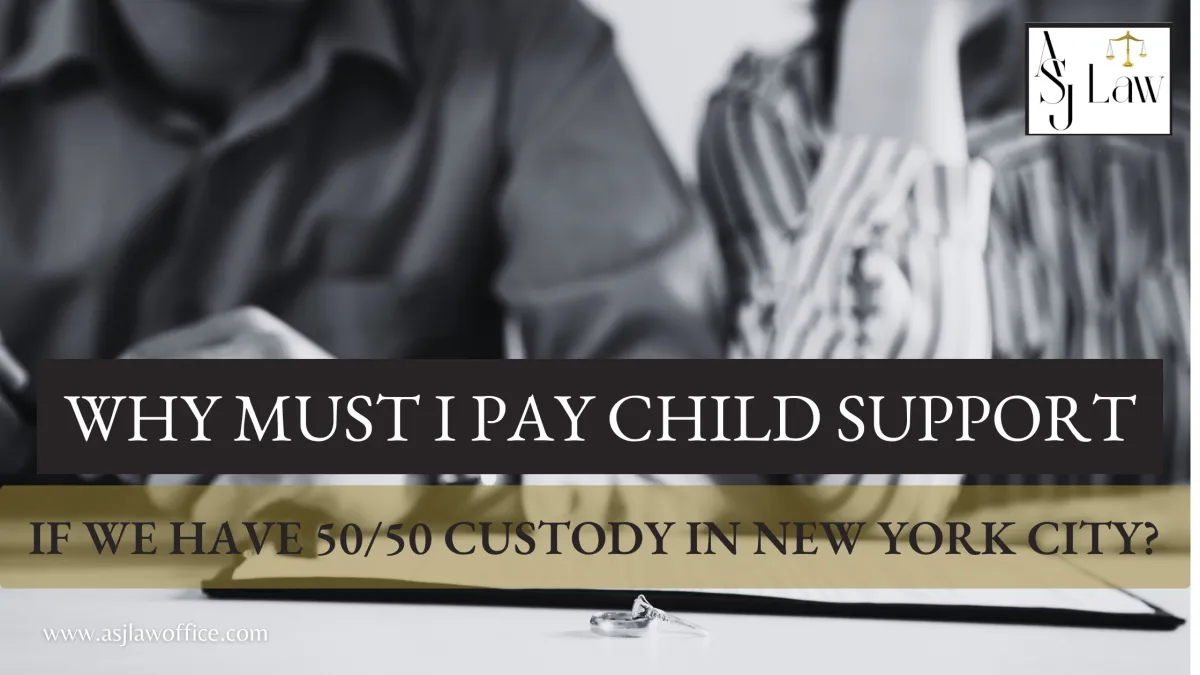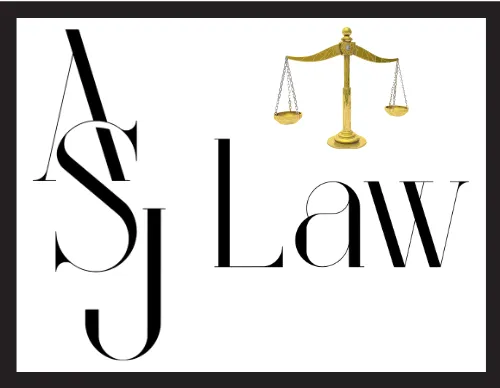
Why Must I Pay Child Support if We Have 50/50 Custody in New York City?
Why Must I Pay Child Support if We Have 50/50 Custody in New York City?
“It’s not fair. We split time 50/50, so why should I pay child support?” That frustration is very common. If you share equal custody of your child in New York City, it may seem logical that neither parent should pay child support. After all, you both spend equal time caring for your child. So why is the higher-earning parent often still asked to pay? Let’s walk through this together and explore why New York law may require child support even in a 50/50 custody arrangement, especially when one parent earns more.

Shared Custody Doesn’t Eliminate Child Support in NYC
The biggest misconception is that 50/50 custody automatically means no child support. It feels counterintuitive. You might be thinking, “We share parenting time equally, so shouldn’t our financial responsibilities be equal too?” The reality, according to New York family law, is more nuanced.
New York courts care most about your child’s well-being and consistent support, not just the clock hours each parent spends. If one parent earns more, child support helps balance the finances so your child enjoys a similar standard of living in both households. It is not about punishing the higher earner. It is about making sure your child has what they need in both homes.
Think of it this way: without child support, one household may be able to provide more resources while the other struggles. That disparity affects the child directly. The goal is to let your child benefit equally from both parents’ financial resources so they feel secure no matter where they are.
How New York Calculates Child Support in 50/50 Custody
Here’s how the courts break it down:
Combined Parental Income: New York uses the Child Support Standards Act (CSSA), which starts by adding both parents’ incomes together. For example, if you earn $100,000 and your co-parent earns $50,000, the combined income is $150,000.
Baseline Support Percentage: A percentage is applied to that combined income based on the number of children. For one child, it is 17% of the combined income. For two children, it is 25%. For three children, 29%, and so on.
Each Parent’s Share:That total support obligation is then divided between the parents according to income. If you earn 66% of the combined income, you are responsible for 66% of the child’s support.
Who Pays Whom: Even with joint custody, the higher earner is usually designated the “non-custodial” parent for child support purposes. That parent pays their share to the lower-earning parent so that resources are balanced.
Additional Expenses: Beyond the basics, parents also share costs like health insurance, unreimbursed medical bills, childcare, and education. These are typically divided in proportion to income.
Why 50/50 Custody Often Still Means Child Support
It can feel unfair to pay when you already cover everything your child needs during your time. You may also wonder, “Is my co-parent really using this money for our child?” These feelings are valid and common.
Remember, though, child support is legally considered the child’s right, not the other parent’s. Courts assume the money will help maintain a stable household for your child. That includes housing, food, utilities, and clothing. The goal is to ensure your child does not experience drastically different living conditions from one home to the other.
New York courts have consistently ruled that when parents share custody equally, the higher earner is still expected to pay child support. The reasoning is simple: children should not suffer or live with fewer advantages just because one parent earns less.
Income Differences Matter, Even in Equal Custody
If you and your co-parent earn the same or very similar incomes, child support may be minimal or even unnecessary. Courts sometimes set a very low amount or none at all in those cases.
However, if there is a large income gap, expect that child support will be part of the arrangement. The law requires the higher earner to contribute more. This applies equally whether the higher earner is the mother or the father. It is based on income, not gender.
Child Support for High Earners in NYC
If you are a high earner, you may worry the formula will force you to pay too much. New York has a cap that protects against this. As of 2024, the formula applies only to combined parental income up to $183,000.
For income above that amount, judges have discretion. They may choose to apply the formula to more income, or they may set an amount based on your child’s actual needs, your financial resources, and the lifestyle your child would have if the family were intact. This flexibility ensures fairness. It prevents overpayment while also making sure children are not under-supported.
“My Friend Handled It Differently” Why Every Case Is Unique
It may be tempting to rely on a friend’s experience, but no two cases are the same. Your income, custody arrangement, and financial responsibilities are unique. Courts will always prioritize your child’s best interests over informal comparisons.
Agreements between parents must still meet the court’s standards. Even if two parents agree to waive support, a judge will not approve it if it leaves the child under-supported. What worked for someone else may not apply to you.
Ensuring Your Child’s Best Interests (and Keeping It Fair for You)
At the end of the day, the requirement to pay child support in a 50/50 custody scenario is there to protect your child, not to penalize you. It helps keep both homes stable and ensures your child thrives in both environments.
If incomes are unequal, support payments ensure your child has consistent resources regardless of which home they are in. If incomes are similar, support obligations may be reduced or eliminated.
New York courts aim to keep outcomes fair and child-focused. Orders can also be modified if circumstances change, such as a job loss or a custody schedule shift.
Final Takeaway
Equal custody does not automatically mean no child support. The deciding factor is income and the child’s needs. If you earn more, you may need to pay something. But remember, it is not about giving money to your co-parent. It is about ensuring your child has a stable life in both homes.
If you are unsure about your situation, it may be wise to consult with a family law attorney.
Knowledge is power, and understanding how the law works will help you approach the process with more clarity and less frustration.

You've got this, and we've got your back every step of the way.
Google Review:
''The truth of the matter is that no one ever screams in excitement about going to court or having to retain an attorney; however, some of us will shout from the mountaintops when we find an attorney we absolutely love. I remember Asia saying something to me along the lines of " You can keep going to court, or we can create a custody order that will last until your child is an adult". At that time, I really needed someone to provide an objective perspective on my case because I was operating based on emotion rather than reason. To this day, I have not had to go back to family court! Asia will thoroughly explain everything to you and provide counsel, but ultimately, you steer the boat. Even if you decide to do something she doesn't recommend, she will still fight tooth and nail for you. No matter what, she will support you 100%. One thing I know to be true is that Asia will not steer you wrong or prolong your case. She's very knowledgeable when it comes to family law and can mitigate any potential issues. As a single mom, I really appreciated being able to use the payment plan they offered. I don't know if any of the other reviews mention fees, so I want to speak on it: not only are Asia's rates reasonable, but her office has THE BEST transparent itemized billing system known to man. You will never question whether you got your money's worth - because you did, and then some!
Honestly, even if things didn't go in my favor (Asia is the best, so of course they did), I would still recommend ASJ Law simply because Asia and her team made me feel like family, not just a file or case number.'' - Koutney


